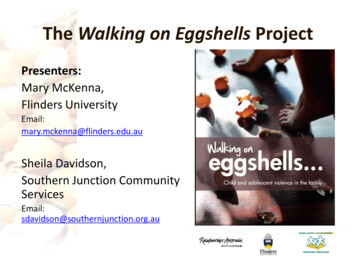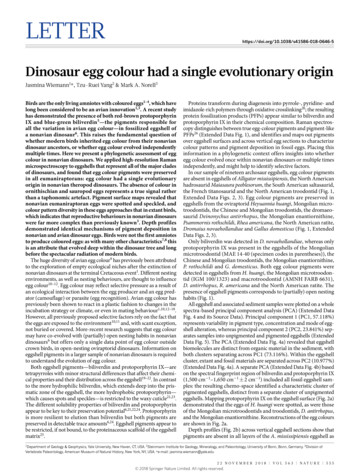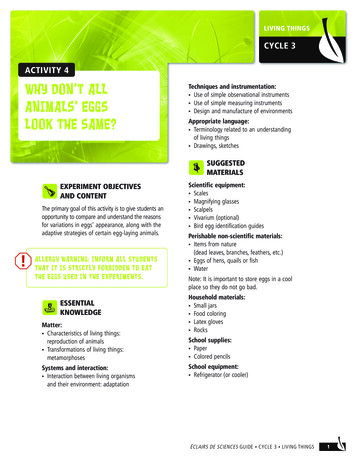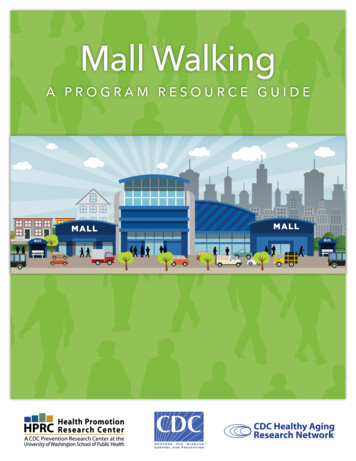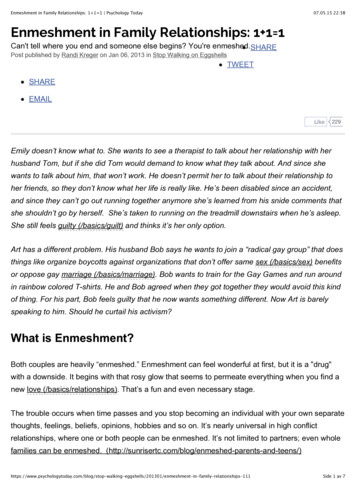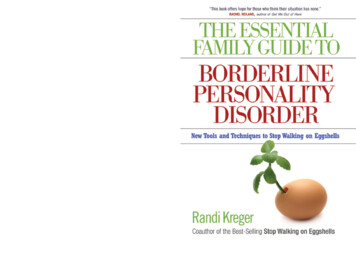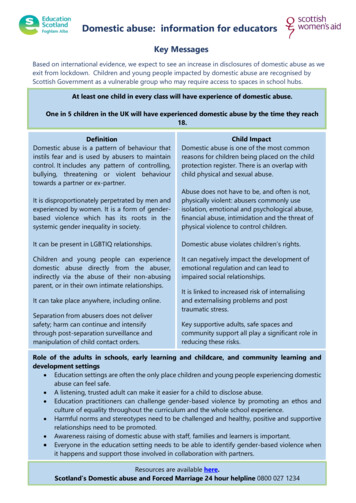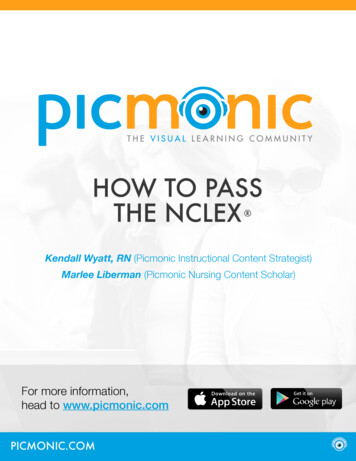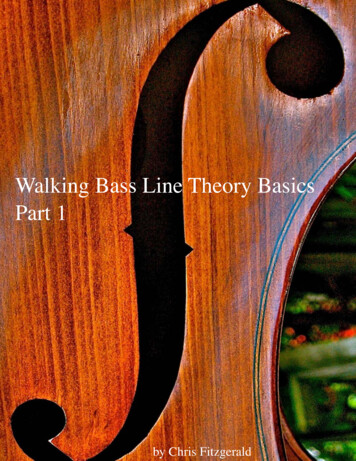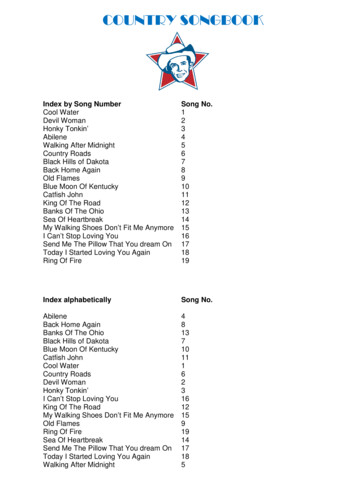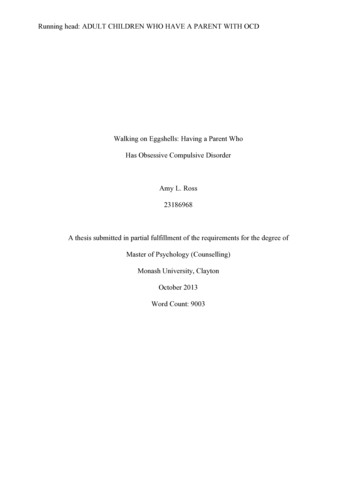
Transcription
head: ADULT CHILDREN WHO HAVE A PARENT WITH OCDRunningWalking on Eggshells: Having a Parent WhoHas Obsessive Compulsive DisorderAmy L. Ross23186968A thesis submitted in partial fulfillment of the requirements for the degree ofMaster of Psychology (Counselling)Monash University, ClaytonOctober 2013Word Count: 9003
ADULT CHILDREN WHO HAVE A PARENT WITH OCDiiTable of ContentsIndex of TablesivList of AppendicesvDeclaration of uction9Prevalence and Negative Impact of Parental Mental Illness9Nature and Prevalence of OCD12Stigmatisation13Family Accommodation14Research Focusing on The Experiences of Children Living with a Parent15with OCDResearch AimMethod1818Participants19Recruitment Procedure21Interview Procedure22Data Analysis22ResultsImpact on Children2324Highly controlled home environment- ‘a lot of arguments’24Effect on schooling25Social isolation26Parentification of children27‘Followed all of the rules’27Positive impact- ‘it makes you more open-minded’28Participant’s Perception of Parental Rearing28‘It would override what she wanted to do’29Relationship with their parent- ‘it was really difficult’29Empathy for their parent- ‘it’s not your parent’s fault’30Distancing oneself and negotiating boundaries30Secrecy31
ADULT CHILDREN WHO HAVE A PARENT WITH OCDTreatment ServicesDiscussioniii3233Limitations of the Present Study39Future Research Directions, Implications and Conclusions40References42Appendices54
ADULT CHILDREN WHO HAVE A PARENT WITH OCDivIndex of TablesTable 1.Participant Demographics20Table 2.Identified Themes24
ADULT CHILDREN WHO HAVE A PARENT WITH OCDvList of AppendicesAppendix A.Schedule for the Adult Semi-structured Interviews55Appendix B.Explanatory Statement58Appendix C.Consent Form (Adult Child)60Appendix D.Ethics Approval from MUHREC62Appendix E.Permission Letter from Professor Don Jeffery63Appendix F.Advertisements Provided Online and to Peer Support Groups 64Appendix G.Newspaper Advertisement in the Leader Community65
ADULT CHILDREN WHO HAVE A PARENT WITH OCDviDeclaration of OriginalityThis project contains no material that has been submitted by the candidate forexamination in any other course, or accepted for the award of any degree or diplomain any University. To the best of the candidate's knowledge it contains no materialpreviously published or written by any other person, except where due reference ismade in the text.The work undertaken for this project was duly authorised by the Monash UniversityHuman Research Ethics Committee (MUHREC) on {5 March 2012}: CF11/3529 –2011001872.Name of Candidate:Amy Louise RossSignature:
ADULT CHILDREN WHO HAVE A PARENT WITH OCDviiAcknowledgmentsI would like to firstly thank my research supervisor, Professor Andrea Reupert for herunwavering support, patience and guidance throughout this year. I am very fortunateto have been able to work with such an inspiring supervisor. I would also like tothank the participants who gave up their time, completing interviews for this thesis.Thank you for being so open and willing to share your stories with me. I would like toacknowledge Krystel Goodman for her contributions in this research project duringthe data collection process and for her ongoing support. Last but not least, a bigthank-you to my dear family and friends for their constant encouragement, love andsupport, it has been greatly appreciated.
ADULT CHILDREN WHO HAVE A PARENT WITH OCDviiiAbstractAustralian literature has indicated that 21-23% of children have at least one parentdiagnosed with a mental illness, with varying levels of risk. However, there is limitedresearch on the experiences of those who have grown up with a parent withObsessive-compulsive Disorder (OCD). Accordingly, the present research aimed toprovide an in-depth understanding of the subjective and retrospective experiences ofadults whose parents have OCD. Within a qualitative approach called InterpretativePhenomenological Analysis (IPA), semi-structured telephone or face-to-faceinterviews were employed. Four inter related themes were identified by eight adultsbetween the ages of 19 and 46 years, with a parent who has OCD. According toparticipants, having a parent with OCD meant a highly controlled home environmentcharacterised by frequent arguments, social isolation, a negative impact on schooling,assuming aspects of the parenting role and participating in their parent’s rituals.Participants emphasised the need to distance themselves and establish boundaries inthe relationship with their parent. Furthermore, some participants expressed concernabout the secrecy around OCD in their family. Participants indicated that they werenot able to access adequate treatment services during their childhood and adolescentyears. The paper concludes with implications for clinical practice and suggestions forfuture research.
CHILDREN WHO HAVE A PARENT WITH OCDADULT9Walking on Eggshells: Having a Parent WhoHas Obsessive Compulsive DisorderMental illness can be defined as a wide range of psychiatric symptoms thatpersist over time and result in significant impairments of an individual’s cognitive,affective or relational abilities (Australian Health Ministers, 1998). The NationalSurvey of Mental Health and Wellbeing (ABS, 2007) found that one in five (20%)Australian adults experience mental illness in any given year and many of theseindividuals are parents (Maybery, Reupert, Patrick, Goodyear, & Crase, 2009).Difficulties such as social isolation, marital discord and financial hardship are notuncommon experiences for families where a parent has a mental illness (Beardslee,Versage, & Gladstone, 1998; Hosman, van Doesum, & van Santvoort, 2009;Nicholson, Biebel, Kinden, Henry, & Stier, 2001). Commonly, mental healthprofessionals often perceive the individual with the illness as the only member of thefamily who requires support and assistance, and are often not aware that their clientsare parents (Aldridge & Becker, 2003; Blanch, Nicholson, & Purcel, 1994; Fudge &Mason, 2004; Murdoch & Hall, 2002). As a result, the needs of the clients’ families,particularly the children are often overlooked (Devlin & O’Brien, 1999; Kroll &Taylor, 2000). However, compared to other children, those who have a parent with amental illness are at a greater risk of developing a mental illness themselves, (Clarkeet al., 2001; Lieb, Isensee, Hofler, Pfister, & Wittchen, 2002; Orel, Groves, &Shannon, 2003; Rasic, Hajek, Alda, & Uher, 2013; Weissman et al., 2006) functionalimpairment, and of experiencing suicidal ideation and suicidal attempts (Hosman etal., 2009). This paper examines a subset of these young people – those whose parentshave Obsessive-compulsive Disorder (OCD).Prevalence and Negative Impact of Parental Mental Illness
ADULT CHILDREN WHO HAVE A PARENT WITH OCD10Australian epidemiological data indicates that 21-23% of children have at leastone parent who has been diagnosed with a mental illness (Maybery et al., 2009), withvarying levels of risk, depending on genetic, child, parent, family and environmentalfactors (Hay, 2004; Hosman et al., 2009).Past research has indicated that a common issue for children living with amentally ill parent (predominantly in sole parenting families), is their tendency toundertake additional age-inappropriate emotional and domestic responsibilities(Aldridge, 2006; Aldridge & Becker, 2003; Dearden & Becker, 1998; Fudge &Mason, 2004; Hayman, 2009; Nicholson, Sweeney, & Geller, 1998; Polkki, Ervast, &Huppoonen, 2004). These children are often required to fulfill multiple roles, such assupporting their mentally ill parent and assuming a number of adult responsibilities(e.g. looking after younger siblings, housekeeping duties and acting as a familyrepresentative; Cowling, 2004). This is often referred to as parentification of childrenas such acts of caregiving responsibilities may result in forced maturity at a youngerage (Hayman, 2009). Parentification has been associated with the restriction ofchildren’s recreation, social, educational performance and personal development(Atkin, 1992; Dearden & Becker, 2000; Frank, Tatum, & Tucker, 1999). Furthermore,parentification has been found to negatively impact on children’s future relationships,with research highlighting an association between parentification during childhoodand insecure attachment to partners in adulthood (Bourassa & Allen, 2010).Family dynamics can be adversely affected by parental mental illness. Forexample, through interviews and participant observations Mordoch and Hall (2008)investigated the impact of parental mental illness including, depression, bipolardisorder and schizophrenia on 22 children (6-16 years). The authors found that forchildren, maintaining distance and clear boundaries between themselves and their
ADULT CHILDREN WHO HAVE A PARENT WITH OCD11parent was important. Further consequences of parental mental illness for childreninclude, problems in social relationships (e.g. hesitant to invite friends over) (Stallard,Norman, Huline-Dickens, Salter, & Cribb, 2004), restricted leisure time (Cooklin,2006), disrupted schooling (Becker, Aldridge, & Dearden, 1998), and interruptions tofamily life (Mordoch & Hall, 2008).A related body of research has investigated the experiences of adult children,asking them to reflect back on their younger years of growing up in a family where aparent experienced a mental illness. For example, Foster (2010) explored theexperiences of 10 adult-children (aged 25-57 years) who had parents with a range ofmental illness including, schizophrenia, severe depression, bipolar disorder, substanceabuse, alcohol abuse and schizoaffective disorder. Similar to other research(Knutsson-Medin, Edlund, & Ramklint, 2007), Foster found that adult childrenrecalled having high levels of caregiving responsibilities. Additionally, participantsnoted the potential strain that parental mental illness has on the child-parentrelationship and described experiencing a range of uncertainties during childhood andadulthood, such as not knowing what to expect on a daily basis.In a somewhat dated paper, Dunn (1993) explored adult children’s experienceof parental psychosis and found that most participants described negative experienceswith health professionals and a lack of information regarding their parents’ mentalillness. Additional findings of an often-chaotic family life, frequented by neglect andabuse were also noted (Dunn, 1993). Regardless of these challenges, participantsemphasised the guilt and loyalty they felt towards their parent.A lack of communication may exist in families with a parent experiencing amental illness. Many parents do not want to place a burden on their children(Montgomery, Tompkins, Forchuk, & French, 2006; Stallard et al., 2004) or consider
ADULT CHILDREN WHO HAVE A PARENT WITH OCD12their children too young to understand or be aware of their illness (Stitt & Reupert,2013). Interestingly, several studies have demonstrated children’s desire for moreinformation, as ascertained from both children and adult children retrospectively(Cogan, Riddell, & Mayes, 2005; Falkov, 1998; Hinshaw, 2004; Polkki et al., 2004;Stallard et al., 2004). Similarly, Knutsson-Medin et al. (2007) explored theexperiences of 36 adult children of former psychiatric inpatients who described a lackof information and support from health professionals and a desire for furtherexplanation and additional support for themselves.Most of the research in this area has focused on parental diagnoses such asattention-deficit hyperactivity disorder, depression, bipolar disorder, eating disorders,and schizophrenia (Biederman et al., 2001; Biederman, Faraone, & Monliteaux, 2002;Del Bello & Geller, 2001; Fellowes-Smith, 2001; Goodman et al., 2011; Leverton,2003; Montgomery et al., 2006; Reupert, Maybery, & Kowalenko, 2012). Overall,studies tend to group diagnoses together, without distinguishing between diagnosticcategories and the potential differences that might arise for families across diagnoses.Minimal research has specifically explored the experiences of adult children of aparent experiencing OCD and the impact it may have on family life. This informationis useful as it can be used to inform intervention supports and resources.Nature and Prevalence of OCDOCD is a common, serious mental illness that affects approximately 2-3% of thepopulation (Heyman, Mataix-Cols, & Fineberg, 2006; Kessler, Berglund, Demler, Jin,& Walters, 2005). The Diagnostic and Statistical Manual of Mental Disorders, FifthEdition (DSM-V; American Psychiatric Association, 2013) defines OCD as recurrentobsessions or compulsions that are time consuming and cause marked distress orinterfere with one’s life. Obsessions are unwanted ideas, impulses or images that
ADULT CHILDREN WHO HAVE A PARENT WITH OCD13repeatedly enter an individual’s mind (Greist & Jefferson, 2007). Common obsessionsinclude: unrealistic and distressing worries about contamination, fear of making amistake, and fear of harm coming to oneself or others (e.g. the fear that their childrenmight be abducted) (Greist & Jefferson, 2007). In response to obsessions, individualsusually attempt to ignore, suppress or neutralise the unwanted thoughts with analternative thought or action, which is referred to as a compulsion (Greist & Jefferson,2007). Compulsions are repetitive, stereotyped behaviours or mental acts thatindividuals feel compelled to do in response to an obsession, often intended toneutralise the high degree of anxiety triggered by obsessions or in accordance to rigidrules (Abramowitz, Taylor, & McKay, 2009). Such rituals are typically not enjoyablefor the individual; instead individuals feel uncertain about whether they have doneenough to prevent potential harm, risk, or danger (Greist & Jefferson, 2007). Giventhe nature of the disorder, OCD has an impact not only on the life of the person withthe diagnosis but also on family members.StigmatisationThe stigma associated with mental illness across disorders has been wellestablished (Angermeyer, Schulze, & Dietrich, 2003; Koschade & Lynd-Stevenson,2011; Östman & Kjellin, 2002; Stengler-Wenzke, Trosbach, Dietrich, & Angermeyer,2004). Stigma not only impacts on the individual experiencing the mental illness, butalso their families including children (Koschade & Lynd-Stevenson, 2011; Östman &Kjellin, 2002). This notion is referred to as associative stigma (Angermeyer et al.,2003; Chang & Horrocks, 2006; Veltman, Cameron, & Stewart, 2002), whichdescribes the stigma experienced by others who are associated with the ‘marked’individual (Corrigan, Watson, & Miller, 2006).Stengler-Wenzke et al. (2004) employed semi-structured interviews with nine
ADULT CHILDREN WHO HAVE A PARENT WITH OCD14spouses, 10 parents and three children of clients experiencing OCD and specificallyexamined how relatives of people with OCD experience stigma and discrimination intheir lives. The authors found that that the disorder was perceived as stigmaprovoking and embarrassing; due to the fear of rejection, family members oftenconcealed the illness from others. Consequently, research has found that not only dochildren have to cope with the difficulty of having a parent who has a mental illness(Angermeyer & Matschinger, 2005), but they may also need to manage the associatedstigma from the community (Koschade & Lynd-Stevenson, 2011).Family AccommodationFamilies of individuals diagnosed with OCD often attempt to stop the ritualsand/or participate in rituals to decrease their relative’s distress (Amir, Freshman, &Foa, 2000; Bloch, Lebowitz, Panza, & Su, 2012; Stewart et al., 2008; Storch et al.,2007). This notion is referred to as ‘family accommodation’ and approximately 7088% of family members report engaging in this behaviour (Stewart et al., 2008;Storch et al., 2007). However, such accommodation inadvertently reinforces theindividual’s fears that underlie rituals and maintains the OCD symptomology (Ferraoet al., 2006; Storch et al., 2007) and increases symptom severity (Merlo, Lehmkuhl,Geffken, & Storch, 2009).Family members may involve themselves in the individual’s symptomology ina variety of different ways. Albert et al. (2010) interviewed 141 family members ofclients with OCD, including 80 parents, 48 spouses, five adult children (18 years )and eight siblings, to ascertain the manner in which family members accommodatedtheir relative’s OCD over the previous month. Themes generated from interviewsfound that family members directly participated in the rituals, assisted the individualto complete their rituals, and/or changed their personal routine (e.g. leisure activities,
ADULT CHILDREN WHO HAVE A PARENT WITH OCD15work agenda) to work around the individual’s symptoms (e.g. not inviting people tothe family home). Similarly, Van Noppen and Steketee (2009) investigated familyaccommodation with adult clients who had a diagnosis of OCD and their adultrelatives, including 20 partners and 14 parents. Interview results identified familyaccommodation as the largest contributor to predicting OCD symptom severity, withfamilies marked by high levels of dysfunction, high levels of burden and rejectingattitudes towards the OCD sufferer.Research Focusing on The Experiences of Children Living with a Parent withOCDParental mental illness is a well-established risk factor for children (Hay,2004; Stallard et al., 2004), and there are certain quantitative studies that haveexplored the impact of parental OCD on this cohort. One factor known to adverselyimpact on children involves parenting interactions (Di Bartolo & Helt, 2007).Challacombe and Salkovskis (2009) investigated interaction styles between motherchild dyads. Questionnaires were administered to mothers experiencing OCD andpanic disorder, and who had at least one child between 7 and 14 years of age and werecompared to mothers not experiencing a mental illness In observed interactionsbetween mother-child dyads, mothers experiencing OCD and panic disorder werefound to be less promoting of psychological autonomy and exhibited less warmthtowards their children, than healthy/unaffected parents without OCD. Another similarstudy found that OCD-affected families scored significantly poorer on communicationand general functioning factors, than families without an OCD parent (Black,Gaffney, Schlosser, & Gabel, 1998). At follow up periods, these children were morelikely to suffer from a range of internalising disorders, including, depression, anxiety
ADULT CHILDREN WHO HAVE A PARENT WITH OCD16disorders, experience social problems and broadly defined OCD symptoms, thanchildren from other unaffected families (Black, Gaffney, Schlosser, & Gabel, 2003).Only two studies have been located that present the lived experiences ofchildren with a parent with OCD (Belman, 1999; Griffiths, Norris, Stallard, &Matthews, 2012). In a case study approach conducted in the UK, Belman (1999)interviewed five children aged between 15 and 25 years from one family, of whichtheir mother had OCD. Griffiths et al. (2012) employed semi-structured interviewswith 10 children between 13 to 19 years of age whose parent had OCD, also in theUK. Participants across both studies described the practical and emotional supportthey provided to their parents. They also described accommodating for their parents ina number of ways, such as providing reassurance and avoiding situations that werelikely to trigger symptoms, (Belman, 1999; Griffths et al., 2012). Additionally,participants described their methods of help as, comforting their distressed parent andavoiding certain behaviours or actions that might make their parent upset (Griffiths etal., 2012).In regards to mother-child interactions, Belman (1999) found that the motheroften used acts of manipulation, guilt, overprotection and restriction to avoid fearedsettings. As a result, children experienced high levels of frustration and anxiety.Griffiths et al. (2012) added to this when authors found that parental OCD providedvarious challenges for children, including issues with parental control and negotiatingboundaries between themselves and their parent. Participants described that both theirspace and possessions were intruded upon by the parent, along with their freedom tomake choices.Lastly, participants in both of these interview-based studies expressed concernsabout stigma and their own mental health. They were more open to discussion about
ADULT CHILDREN WHO HAVE A PARENT WITH OCD17OCD when their parents were in control of their symptoms, and described feelings offrustration toward the lack of recognition regarding the difficulties they face (Belman,1999; Griffiths et al., 2012). Many viewed OCD as a sensitive and embarrassing topicto address with others. As a result, participants reported that they kept the knowledgeof their parents’ OCD a secret, and were very selective about whom they told(Griffiths et al., 2012). Participants felt that although they had accepted their parent’sillness, they recognised their own need for more support and felt additionalinformation and support would be helpful. A common theme across several studies isparticipants’ concerns about their own mental health and more specifically that theymight develop OCD themselves (Black et al., 2003, Griffiths et al., 2012; StenglerWenzke et al., 2004).The previously mentioned research suggests that parental OCD can potentiallylead to adverse consequences for children in social relationships, school, leisure,family life and relationships (Belman, 1999; Black et al., 1998; Black et al., 2003;Griffiths et al., 2012). Two studies (Black et al., 1998; Black et al., 2003) employed amixed method approach, including participant self-reports and brief narratives ratherthan in depth interviews to capture the voices of these children. Further, both studieswere designed to identify pre-morbid signs of OCD as a guide for treating clinicians.Only two studies in the aforementioned literature (e.g. Belman, 1999; Griffiths et al.,2012) have explored the child’s individual, subjective experiences of having a parentwho has OCD. However, both studies were conducted in the UK and participantswere recruited from a clinical setting via their parents, who were provided withmental health services. How other young people whose parents are not currently intreatment manage their parents OCD has not been ascertained. Identifying participantsdrawn from the community rather than via parents attending treatment centres might
ADULT CHILDREN WHO HAVE A PARENT WITH OCD18assist in understanding how parental OCD may impact on children in different ways.For example, parents who are receiving treatment for their OCD might manage familylife differently than those who are not receiving treatment, and their children mightalso experience these differences.Thus, given the limited research in this area, this research will examine theexperiences of those who grew up with a parent experiencing OCD, but this timedrawn from the community rather than via parents attending treatment centres. Thisallows for claims to be made about the validity of the two previous qualitative studies,which might then be applicable in more than one context, especially outside oftreatment settings. Moreover, adult children have the language development andopportunity for reflection (given their maturity), to provide an in-depth retrospectiveview of what it is like to live in these families, that young people who are presentlyimmersed in these families, may not. The information collected from these adultchildren may provide valuable insight to inform service delivery and policy, and willassist in providing appropriate support to children and families with parents who haveOCD.Research AimThe current study aimed to use a qualitative methodology to explore thesubjective experience of being an adult child of a parent with OCD, by obtainingretrospective accounts of their experiences during childhood/adolescence, whilstliving in these families. An exploratory approach was adopted in which themes wereidentified, sought from participants rather than predetermined hypotheses (Reupert &Maybery, 2009).MethodAn interpretive approach to data collection was employed in order to explore
ADULT CHILDREN WHO HAVE A PARENT WITH OCD19and understand the lived experiences of adult children with a parent who has OCD,through their individual perceptions and experiences as interpreted by the researcher.Reflecting this explorative approach, in-depth, one-to-one, semi-structured interviewswith young adults were employed as the method of data collection. A qualitative,interview framework is appropriate given participants’ potential vulnerability and theneed to discuss their experiences in a reflective manner.ParticipantsEight adults were recruited from social media and a community based agencyto participate in the present study. It is important to note that differently to otherstudies, participants recruited from the agency were clients of the service and notrecruited via their parents, who were receiving mental health services by the agency.All participants were between the ages of 19-46 years and had a parent who had beendiagnosed with or demonstrated OCD symptoms. Of the eight adults, the mean agewas 29 years (SD 8.64). Six adults had a parent diagnosis of OCD, and twoparticipants had a parent presenting with OCD symptoms, but had not received aformal diagnosis. Four of the eight parents were also diagnosed with a secondarymental illness. All participants but one lived in Australia, with one participantresiding in the United States of America. Two of the eight adults were currentlyresiding with their parent. See Table 1 for participant demographics. Two of the eightparticipants were siblings.
ADULT CHILDREN WHO HAVE A PARENT WITH OCD20Table 1Participant DemographicsDemographicsNumber of ParticipantsAge range18-23224-29430-35036- 41142-471GenderMale1Female7Gender of Parent with OCDMale1Female7Parents’ DiagnosisObsessive Compulsive Disorder (diagnosed)6Obsessive Compulsive Disorder (undiagnosed)2Parents’ Secondary xiety1Generalised Anxiety Disorder/Agoraphobia1Participants’ DiagnosisAnxiety1Co-morbid Generalised Anxiety Disorder/ Depression2Depression (previous not current diagnosis)2Co-morbid Obsessive Compulsive Disorder/Depression/Anxiety1Parents’ Currently Engaged with Treatment chiatrist1
ADULT CHILDREN WHO HAVE A PARENT WITH OCD21Recruitment ProcedureOnce ethics approval was granted from Monash University Human ResearchEthics Committee (MUHREC) (see Appendix D), prospective participants wereinvited to participate in the study. Participants were recruited through:1) social networking sites such as Facebook and online advertisements.Websites included the National Children of Parents with a Mental IllnessInitiative (COPMI), Anxiety Disorders Association of Victoria(ADAVIC) and the Anxiety Recovery Centre Victoria (ARCVIC) (seeAppendix F).2) advertisements were provided to peer support programs offered acrossVictoria for individuals whose parent have OCD, via the peer supportgroup facilitator at ARCVIC (see Appendix F).3) a seven-day newspaper advertisement was placed in the LeaderCommunity newspaper (see Appendix G).4) advertisements seeking individuals whose parent have OCD wereprovided to the Melbourne Clinic in Richmond, with the permission ofProfessor Don Jefferys, a Clinical and Counselling Psychologist (seeAppendix E).Criteria for inclusion included males or females who were over 12 years ofage, and had a parent who had been diagnosed with or demonstrated symptoms ofOCD. It needs to be noted that while recruitment targeted children over 12 years ofage, those who elected to participate were all over 18 years of age. Parental consentwas required for those under 18 years. The criteria were purposefully broad given theexploratory nature of the study. All potential participants were invited to contact theresearcher for more information regarding the study (see Appendix B and C). Prior to
ADULT CHILDREN WHO HAVE A PARENT WITH OCD22interviews, all participants received an explanatory statement (see Appendix B) andwere required to sign a consent form prior to participation (see Appendix C). As all ofthe participants were over the age of 18 years, parental consent was not required.Interview ProcedureSemi-structured interviews were conducted either face-to-face or viatelephone by the researcher, at a pre-arranged negotiated time (see Appendix A). Theinterview schedule was guided by the literature review and the research intentions ofthe project but was flexible to explore the subjective experiences of participants. Theschedule included a series of questions relating to family circumstances, including theparticipants’ relationship with their parent, how they coped (or did not cope) livingwith parental mental illness and sources of support they drew on or wanted to drawon, as a young person. Such as, “How was school life for you?” and “How did youfirst learn about your parent’s mental illness?” Interviews ranged from 30-60 minutesin duration and with participant consent were all digitally voice recorded, to allow theresearcher to have accurate recordings of the interview data in a usable format. Theresearcher sent the participant the transcript and they were given the opportunity tomodify or add to any responses, in a process referred to as ‘respondent validation’(Burnard, Gill, Stewart, Treasure, & Chadwick, 2008). Analysis commenced onceparticipant feedback had been incorporated.Data AnalysisData analysis drew on 78 pages of interview data. Analysis was framed usingInterpretative Phenomenological Analysis (IPA) (Smith & Osborn, 2004). IPA is aqualitative approach that aims to identify themes within the participant’s subjectiveexperience and was comple
Walking on Eggshells: Having a Parent Who Has Obsessive Compulsive Disorder Mental illness can be defined as a wide range of psychiatric symptoms that persist over time and result in significant impairments of an individual’s cognitive, affective or relational ab
